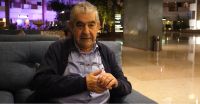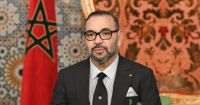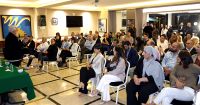What many of Gloria Chacon’s young clients don’t know is that she spent her high school years living here illegally.
A fellow at the legal nonprofit The Door, Gloria Chacon represents young undocumented immigrants who are trying to stay with New York-based relatives and avoid deportation back to Central America.
Many of the kids she works with are amazed to learn that — like them — she first arrived in the U.S. from Central America as a teenager.
What they also don’t know is that Chacon — an attorney who secured a prestigious Immigrant Justice Corps fellowship after graduating from New York Law School — spent her high school years living here illegally.
Chacon’s immigration woes were soon overshadowed by a cancer diagnosis and the amputation of a foot. Her personal history underpins her drive to quickly make a difference in her clients’ lives — and she considers herself fortunate.
“I have been very lucky that my life took me this way, in a way,” said Chacon, 26. “I really like my work right now. I just feel lucky and grateful.”
After an uncle was murdered when she was 15, Chacon fled Honduras with her younger sister and her mother, amid death and rape threats from political opponents of the family.
Her grandmother, a permanent U.S. resident, had petitioned for green cards for both girls and their mom. However, after Chacon’s mother narrowly missed being shot, she realized they couldn’t wait the years it would take for their visas to be finalized.
Chacon herself once answered the phone at their Honduras home to hear a threatening voice on the other end of the line.
“Suddenly there’s someone who sounds really strange on the other side, telling you that one day when you come back from school they are going to break into your house and rape you. Pretty scary,” said Chacon. “We decided that even though our papers had not come through, we were going to come (to the U.S.)”
The three flew to stay with an aunt in New Jersey and ended up overstaying their tourist visas. Now that she is trained as an immigration lawyer, Chacon realizes they had other options, including a bid for asylum.
“We did not have a good attorney. I didn’t realize a lot of this until I took immigration law myself. If we had had a well-versed attorney or someone who knew maybe a little bit more than just family processing, there were ways for us to get status sooner. We ended up undocumented for three years,” she said.
Soon after starting school in the U.S., Chacon injured her foot playing volleyball. Doctors didn’t realize what the real problem was until two years later, when X-rays revealed a tumor.
She didn’t respond to chemotherapy or radiation, so doctors amputated her right foot when Chacon was a senior in high school. The cancer has not returned.
“In the span of one year I went from having cancer to being an amputee to graduating high school and starting college,” she said.
The family’s immigration papers came through during her first semester of college, and Chacon ultimately graduated from Rutgers University.
She enrolled in New York Law School, with plans to focus on international law.
“I originally didn’t think I would do immigration. We had a difficult time being immigrants ourselves and I think I was a little sore from that,” said Chacon. But New York Law Prof. Lenni Benson, director of The Safe Passage Project, which provides counsel to undocumented children, encouraged Chacon to volunteer. Soon she realized that immigration law was a much better fit.
After graduation, she became one of 25 new lawyers selected to be a part of the Immigrant Justice Corps’ inaugural class of fellows. The new two-year program, the vision of Chief Judge Robert Katzmann of the U.S. Court of Appeals for the Second Circuit, puts talented new lawyers in the position to represent immigrants fighting deportation.
It also gives a group of younger, undergraduate fellows experience helping immigrants navigate bids for citizenship and other benefits.
Chacon said she now feels like she’s in the right place at The Door in SoHo — helping young immigrants who have fled their Central American homelands.
“You ask most of them why they came, and they won’t talk about the abuse they suffered, or the gang violence ... they will just be like, I want to go to college and study,” Chacon said. “A huge majority have very big dreams.”
Source: NY Daily News





